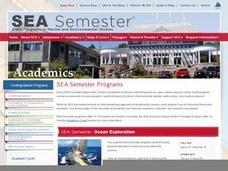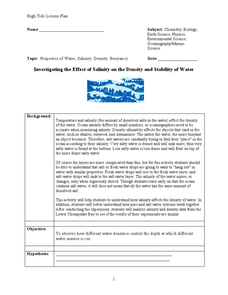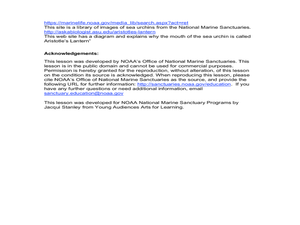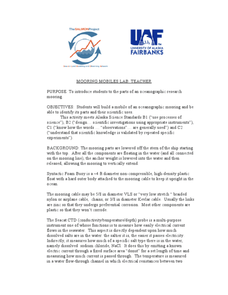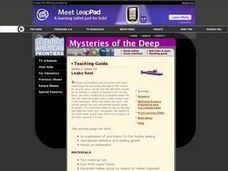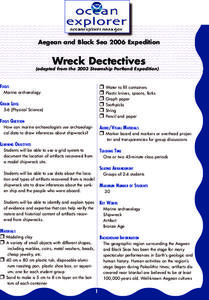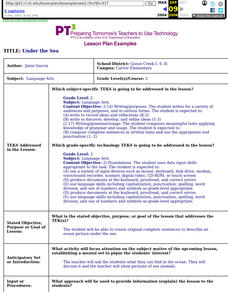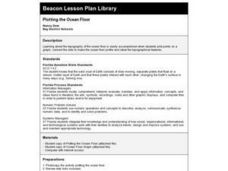NOAA
Ocean Exploration
Where am I? The second installment of a 23-part NOAA Enrichment in Marine sciences and Oceanography (NEMO) program starts with pupils guessing the years in which major ocean exploration events took place. The lesson then focuses on how...
Teach Engineering
The Great Pacific Garbage Patch
The Great Pacific Garbage Patch is one of several garbage patches around the world where garbage accumulates naturally. As part of a GIS unit that combines oceanography, environmental science, and life science, class members investigate...
Curated OER
Creature From The Deep
Students become familiar with oceanography terms by writing an oceanography horror story.
Curated OER
Investigating the Effect of Salinity on the Density and Stability of Water
Water with varying amounts of dissolved salt are dyed and then used to compare densities. The objective is to discover the effect of salinity, and therefore density, on ocean water on the stability of the ocean. Many branches of science...
Curated OER
Sea Urchins - Diadema Antillarum
Pupils investigate oceanography by painting sea life. In this crustacean lesson, students identify sea urchins in our ocean environments and describe the functionality of their spherical-shaped bodies. Pupils design their own sea urchins...
Curated OER
If I Can't See It, How Do I Know It's There?
Young scholars build a model ocean using a variety of materials representing the various levels of the ocean. They collect data about the ocean floor in a partner activity. They practice working with topographical mapping grids.
Curated OER
Habitats of the Pond
Students explore biology by researching habitats for organisms. In this water environment lesson, students utilize a magnifying glass to examine the different organisms that live on a nearby pond or lake and explore their habitats....
Curated OER
Sustainable Southern Belize: Coral Health Lesson Plan
Fifth graders investigate coral reefs and the dangers they face by labeling and drawing. In this oceanography lesson, 5th graders view a PowerPoint presentation of photographs of coral reefs in Belize. Students investigate...
Curated OER
Mooring Mobiles Lab
Oceanography experts use candy to construct a model of a bio-physical mooring that would test a variety of factors. Each piece of equipment to be included on the mooring is described within the write-up. As pupils gather the candies for...
Curated OER
Leaky Seal
Junior high schoolers explore possible theories for the cause of the Hunley submarine sinking. Through hands on activities, they investigate how to create a waterproof seal. Afterwards, they discuss how seals work and various...
Curated OER
Wreck Detectives
Junior archaeologists examine types of artifacts from the Bronze Age on the internet. In collaborative groups, they create a story about a ship from this period and then construct a model of the ocean floor after their ship has sunk....
Curated OER
The Oceans Below
Young scholars investigate the geological characteristics of the ocean environment and create a labeled drawing of the ocean floor's geography. Students view videos and conduct Internet research about the ocean's floor and then create...
Curated OER
Under The Sea - Describing an Ocean Picture
Second graders create original complete sentences to describe an ocean picture under the sea. After a lecture/demo, 2nd graders use a software program to create their own undersea scene, complete with pictures and writing.
Curated OER
Plotting the Ocean Floor
Fourth graders plot points on a graph, connect the dots to make the ocean floor profile and label the topographical features. They utilize a worksheet and a website imbedded in this plan to plot the ocean floor.
Curated OER
Tides and How Creatures Survive
Students discover tidal pools. In this oceanographic lesson plan, students observe the tides of the earth and the creatures that inhabit the intertidal zones. Students role-play the tidal zones by portraying themselves as...
Curated OER
Animal Movement in Water
Students explore oceanography by participating in field trip activities. In this fish characteristics lesson plan, students attend a trip to a local beach or reservoir and collect different specimens in order to examine them. Students...
NOAA
Waves
Is it possible to outrun a tsunami? After watching a presentation that explains how waves and tsunamis occur, class members investigate the speed of tsunamis triggered by an earthquake.
NOAA
Mud is Mud...or is it?
We know that the type of soil varies by location, but does the seafloor sediment also vary, or is it all the same? Scholars compare photos of the seafloor from two different locations: the Savannah Scarp and the Charleston Bump. Through...
National Wildlife Federation
Why All The Wiggling on the Way Up?
Some of the CO2 emitted by burning fossil fuels is removed from the atmosphere by natural sinks, such as the ocean. The fifth engaging lesson in the series of 21 examines the CO2 data from three very different locations. It then makes a...
Curated OER
Marine Environmental Geology
Students take this course as an introduction to the aspects of marine geology and oceanography that affect the environment and marine resources. Topics include estuarine oceanography and sediments, eutrophication of coastal waters,...
Curated OER
Ducks in the Flow: Resources about Surface Ocean Currants for the Upper Elementary Classroom
Students investigate surface ocean currents. In this oceanography lesson, students work in small groups to create models that demonstrate surface currents, the Coriolis Effect, and how surface currents move debris. This lesson includes a...
Curated OER
Meet the Corals
Students investigate the types of coral. For this oceanography lesson, students access the Fisheye View Cam Website and create their own coral garden by using various art supplies.
Curated OER
Ocean Currents
Learners discover the geography of Earth by analyzing water currents. In this oceanography lesson plan, students create visual references on a map of the globe where and why major ocean currents are moving water. Learners...
Curated OER
Obis Oil Spill
Pupils explore environmental challenges by participating in an oil spill simulation. In this water safety lesson, students discuss why oil spills happen and how their impact affects the entire ecosystem. Pupils utilize popcorn, rubber...


